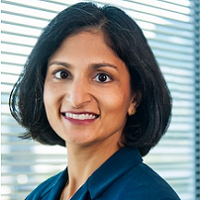 By Meena Seshamani, MD, PhD, Deputy Administrator and Director of Center for Medicare, CMS
By Meena Seshamani, MD, PhD, Deputy Administrator and Director of Center for Medicare, CMS
Twitter: @CMSGov
April marked the 10-year anniversary of the start of the agreement period for the first Accountable Care Organizations (ACOs) in the Medicare Shared Savings Program (Shared Savings Program) – an ambitious program to reward health care providers for improving health care for people with Medicare. The program now includes 483 ACOs with over 525,000 participating clinicians serving more than 11 million Medicare beneficiaries.
Shared Savings Program ACOs are groups of doctors, hospitals, and other health care providers who join together voluntarily to give coordinated, high-quality care to Medicare beneficiaries with the goal that people receive the right care at the right time, while avoiding unnecessary duplication of services and preventing medical errors. When an ACO succeeds both in delivering high-quality care and spending health care dollars more wisely, the ACO may be eligible to share in the savings it achieves for the Medicare program. In certain instances, an ACO may owe a portion of losses to the program if it increases Medicare costs.
As outlined in CMS’s vision for the future of Medicare, the Shared Savings Program is a critical component of CMS’s vision to advance health equity, drive high-quality, person-centered care, and promote affordability and sustainability of the Medicare program. To date, Shared Savings Program ACOs have demonstrated promising results: better performance compared to physician groups reporting the same quality measures in the Merit-based Incentive Payment System, and approximately $6 billion dollars in estimated savings for the Trust Fund over the past five years.¹
As the Director for the Center for Medicare, I see first-hand how the program is a win-win for people with Medicare and the people who provide care to them. Recently, I had the pleasure of visiting an ACO in New York City that primarily serves people of all ages with intellectual and developmental disabilities. The staff shared the innovative work they do to connect care across the hospital, clinic, and group homes where a significant portion of their enrollees reside, using dashboards to track quality metrics and establish person-centered care plans, and bringing electronic records to community settings. I asked them how they communicate how their work is different from providers not in accountable care arrangements to the people, and caregivers they serve– and the answer was simple: they do everything they can to keep people out of the emergency department.
During ACO Learning System sessions, many ACOs have reported using Medicare’s Annual Wellness Visit to screen for social needs like safe housing or access to healthy food and transportation. ACOs often hire community health workers and social workers as community navigators and use technology to connect patients with community resources. As a result, people whose providers participate in ACOs are more satisfied² and problems are prevented before they begin.
CMS is taking steps to align our value-based care strategy across the Shared Savings Program and our Center for Medicare and Medicaid Innovation models. Through the ACO REACH Model, we will be testing various refinements to improve our models for accountable care. If those refinements further improve quality and reduce the total costs of care, they could be scaled into the Shared Savings Program, thereby advancing equity by expanding the reach of ACOs into underserved communities.
We must capitalize on the success of the Shared Savings Program and the other lessons learned from value-based care to help us reach our goal for all people in Traditional Medicare to be in an accountable care relationship with their health care provider by 2030. By increasing ACO participation and accelerating care transformation, Medicare can continue to lead the way for payers, health care providers, and purchasers across the country to advance accountable care. As we engage Medicare beneficiaries, clinicians, and the communities we serve throughout the policymaking and implementation process, we are inviting health care providers and other stakeholders to work with us to meet our 2030 goal. We are especially interested in hearing from health care providers who have participated in the Shared Savings Program in the past or are considering creating an ACO in the future so that we can work together to identify an appropriate path for their participation.
Medicare remains a bedrock of our nation’s health system and has significant influence on how it operates. Achieving our goals in Medicare will have an outsized influence on health care delivery across the country. We are committed to working with ACOs to improve upon the Shared Savings Program and continue to strengthen Medicare, not only for the next ten years, but for generations to come.
¹ The regulatory impact analysis for the December 2018 Shared Savings Program final rule, 83 Fed. Reg. 67,816, 68,043 (Dec. 31, 2018), estimated national FFS spending was 0.7 percent lower than if it had grown at the faster rate observed for the subset of markets with low ACO activity. This estimate represented 0.5 percent lower net spending after accounting for shared savings payments, or about $1.7 billion. Program changes and the COVID-19 public health emergency have hindered the ability to update this estimate for more recent years. Assuming the program only maintained the lower 0.7% spending level in subsequent years would imply total program net savings of approximately $6 billion over 2016 to 2020 despite the higher aggregate shared savings payments distributed to ACOs in 2019 and 2020.
² McWilliams, Michael, Bruce E. Landon, Michael Chernew, and Alan Zaslavsky. “Changes in Patients’ Experiences in Medicare Accountable Care Organizations. N Engl J Med 2014; 371:1715-1724 DOI: 10.1056/NEJMsa1406552
This article was originally published on the CMS Blog and is republished here with permission.
